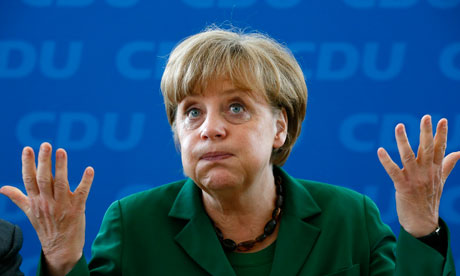Eurozone crisis: Merkel tells Athens and Paris to stick to spending limits
Efforts to save the euro under threat after EU leaders' strategies collide with the wishes of voters in Greece and France

The impasse was most graphically demonstrated when Germany's chancellor, Angela Merkel, insisted Athens must comply with the stringent terms of its €130bn (£100bn) bailout even though more than 60% of the Greek electorate had voted for parties rejecting those terms.
Following a French election campaign in which she strongly backed the loser, Nicolas Sarkozy, and snubbed the president-elect, François Hollande, Merkel stressed her opposition to Hollande's central campaign pledge: reopening the euro's new rulebook, or fiscal pact.
"That's just not on," she told a Berlin press conference called to address the huge shift from right to left in France.
The first attempt to cobble together a new Greek government collapsed quickly when Antonis Samaras, the centre-right leader, called off negotiations. Greece appears to be on the brink of ungovernability as a result of a messy election triggered by the euro crisis. The stock market suffered its worse fall since 2008, losing as much as 8% of its value before closing 6.7% down. The country's banking index was 13% lower.
Market analysts shortened the odds against the country's chances of surviving in the single currency.
"The irresistible force of German austerity has clashed with the immovable object of Greek popular resistance," said Tristan Cooper, sovereign debt analyst at Fidelity Worldwide Investment. "The eurozone's weakest link just got weaker. Although it should be no surprise that Greeks are spurning the bitter medicine, the violence of the rejection is a shock. A Greek eurozone exit is now firmly on the cards."
But Klaus Regling, the German head of the eurozone's temporary bailout fund, warned that a return to the drachma would "be a catastrophe for Greece".
In an election that saw the most spectacular collapse of big established parties in modern European democracy, the centre-right New Democracy and the centre-left Pasok mustered just over 30% of the vote between them, compared with almost 80% three years ago.
Samaras, the New Democracy leader, said he had "returned the mandate", abandoning the attempt to construct a parliamentary majority. "We did whatever was possible," he said.
The big winner, Syriza, a coalition of leftist radicals that came second, squarely blamed Merkel for the mess. "European leaders and especially Merkel have to understand that austerity policies have suffered defeat," said its young leader, Alexis Tsipras.
After two years of prescribing austerity as the cure for the debt disease and establishing the legal instruments to entrench it, EU leaders have now switched to talking of growth strategies. They speak of the merits of growth, but are split on how to achieve it.
Both centrist leaders in Athens, Antonis Samaras of New Democracy and Evangelos Venizelos of Pasok, called for the bailout terms to be renegotiated, putting the commission, the International Monetary Fund, and the European Central Bank on the spot.
"We've said over and over that Greece should stay in the euro. But everyone has to carry their responsibilities. Solidarity is a two-way street," said Amadeu Altafaj, spokesman for Olli Rehn, the euro commissioner. "Timely implementation of the programme is of the essence."
That appears a tall order, though, with Greece apparently condemned to weeks or months of instability and the possibility of having to stage yet another election.
Merkel has her own electoral problems. After losing a regional state election on Sunday and facing a sterner test next weekend in the key state of North-Rhine Westfalia, she stuck to her hard line on fiscal rigouron Monday. But she was also generous towards Hollande, saying she would welcome him to Berlin "with open arms". Hollande, who has never met Merkel, has said he will go to Berlin the day after he is sworn in, scheduled for next Tuesday.
With European politics flirting with meltdown as incumbent leaders are felled, the renewed air of emergency is generating heated language from senior figures, mainly directed at Merkel.
On Monday the former president of Latvia, Vaira Vike-Freiberga, argued that the EU was becoming both dominated and neglected by Germany.
"Is the Europe that is emerging from the euro crisis a German one? During the euro crisis, power in the EU seems to have shifted towards one national capital in particular, Berlin," she wrote in Warsaw's Gazeta Wyborcza, together with Portugal's former European commissioner Antonio Vitorino. "Germany, it seems, is becoming a 'geo-economic power' driven by the needs of its export sector. By using economic means to pursue its foreign-policy ends, Germany is gradually turning its back on its European partners."
The anti-German sentiment, which has Berlin worried, is echoed in a cri de coeur from Greece's outgoing development minister and former European Commissioner, Anna Diamantopoulou, to Jacques Delors and Romano Prodi, two former commission heads, couched as an "SOS" to save Europe. Her letter, leaked to the Guardian, argues passionately that the austerity gripping Europe has reduced the union to quasi-wartime conditions. "It is like a war when a country loses 20% of its GDP in 18 months. It is like a war when we have the reappearance of rations in European capitals. It is like a war when millions of young people, the best and the brightest, leave their countries behind," she wrote.
"Greece, Italy, Spain, Portugal, Ireland and even France are in the midst of a forest fire which is spreading alarmingly fast. The belief that such a fire can be stopped at national borders is misjudged. The European Council has been shrunk by the authority of its financial powerhouse, Germany."
* * *The euro alternative to Greek default and the drachma
Decisive votes against austerity in Greece and France mean the ECB and Germany have to change policy to save the eurozone

Austerity was the big loser in the Greek elections on Sunday. The two main Greek parties, who endorsed the austerity pact signed last year, together got just over one-third of the vote. This is an extraordinary rebuke given that, between them, these parties have governed Greece since the end of the dictatorship in 1976.
On the anti-austerity side, a leftwing coalition came in second with around 17% of the vote. More ominously, a far-right anti-immigrant party, which is also anti-austerity, received almost 7% of the vote.
It is important for people elsewhere in the world, and especially in Europe, to understand that the Greek voters were not just being cranky kids who refuse to take their medicine. There is no doubt that Greece's government and economy were poorly managed in the years leading up to the crisis. However, the current path of austerity does not offer the country a path to a better future. The current path of austerity is simply a path of pain as an end in itself.
This can be seen from examining the official projections. The IMF now projects that 2012 will be Greece's fifth successive year of economic contraction, with 2013 being a year of stagnation. Even with growth projected to resume again in 2014, Greece's per capita income is still projected to be more than 8% lower than it was a decade earlier. Its unemployment rate, which is currently hovering near 20%, is still projected to be almost 15% in 2017. And its debt to GDP ratio is projected to be 137% in five years – far higher than it was at the onset of the crisis.
This is not a path to a healthy economy. And it's important to remember that the projections from the IMF and European Central Bank have consistently proven to be overly optimistic. Given this economic reality, it's difficult to see why the Greek people should go any further with such a disastrous policy.
The argument usually given is that there is no alternative. This is not true. Leaving the euro and bringing back the drachma is an alternative, however disruptive this may prove to be.
Leaving the euro would spark a financial and political crisis, but ultimately, this move would almost certainly leave Greece better-off than staying on its current deadend path. With a devalued currency, Greece would become much more attractive as a tourist destination. Its agricultural exports would be much more competitive in the European Union and elsewhere.
It would be necessary to renegotiate debts. Where this can't be done, there will inevitably be many bankruptcies for those with large euro-denominated debts. This process will not be pretty, but there can be little doubt: at this point, it is the better path forward.
The model here is Argentina. After it defaulted and broke its currency link with the dollar at the end of 2001, its economy plummeted for three months. It stabilized in the second quarter of 2002 and then began six and half years of solid growth that was only derailed by world economic crisis in 2009.
There are reasons why Greece will have a more difficult path than Argentina; most importantly, Argentina always kept its own currency. But even if Greece can only achieve half the pace of growth sustained by Argentina, its prospects by going this route look far better than staying in the euro.
There is an alternative path that would be preferable to Greece leaving the euro: this would be the path where the ECB abandons its austerity path altogether. This would involve some sort of ECB guarantee for the debt of Greece and other heavily indebted countries, a relaxation of budget restrictions across the eurozone and, most importantly, a commitment to sustain a higher rate of inflation in Germany and other core eurozone countries. The latter is essential since it is the only way that Greece and other peripheral countries will be able to regain competitiveness if they stay in the euro.
Two weeks ago, the possibility of this sort of change of course seemed far-fetched. Today, it still seems unlikely – but following the elections in Greece and the defeat of Sarkozy in France, a major change in course is beginning to look like a possibility.
The leadership of the ECB and Germany may not recognize it, but their current path is unsustainable. The only question is whether they can adjust before the institutions of Europe begin to collapse around them. On Sunday, the voters in Greece gave this message as clearly as possible.
No virus found in this message.
Checked by AVG - www.avg.com
Version: 2012.0.1913 / Virus Database: 2425/4984 - Release Date: 05/07/12

No comments:
Post a Comment